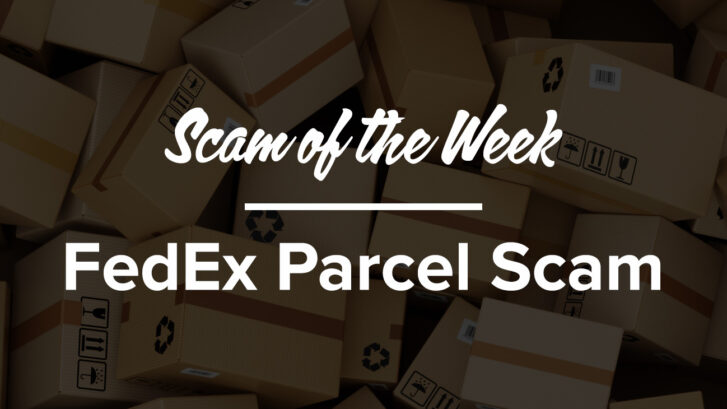There is no doubt that scams pose a serious threat to peoples’ private information. What makes them even more threatening is the fact that many scams are masqueraded as an innocent person or company to the unsuspecting victim. Such is the case with the FedEx Parcel Scam, which attempts to extract confidential information through fraudulent tactics that create both fear and a sense of urgency. By frantically telling folks that there have been multiple attempts at making a delivery with nobody to sign for it, people feel the need to move through the prompts to remediate the situation. Ultimately, this can make someone highly vulnerable to being scammed.
In this article, we cover:
- What is the FedEx Parcel Scam?
- Why the FedEx Parcel Scam is dangerous
- How to protect yourself from the FedEx Parcel Scam
What is the FedEx Parcel Scam?
We all know FedEx as the global logistics company that provides a wide range of services, including ground and air transportation, international shipping, packaging supplies and business services. What is less familiar, however, is the FedEx Parcel Scam, which is set up to take users’ personal information. The scam impersonates a delivery notification from FedEx International Express. It informs users that they have attempted to make a delivery twice and no one has signed for it. It then prompts the user to press a number to speak to a representative. The scam is then repeated in Chinese.
FedEx Parcel Scam audio
“Fedex international Express will inform you for the last time
that you have a parcel that has been delivered twice
and no one has signed for it.
For english inquiries,
please press 1,
and Chinese,
please press 2.
Fedex国际快递将最后一次通知您
你有一个包裹被送过两次
并且没有人签署它
英文查询请按1,中文请按2″
Why the FedEx Parcel Scam is dangerous
The FedEx Parcel Scam poses a threat to anyone who may be expecting a package or delivery. If you’re caught off guard, the scam makes you vulnerable to moving through prompts, which can ultimately relinquish private information and put you at risk. In addition, some scammers are also turning to SMS and text messages to relay the same information. According to bestlifeonline.com, “experts warn that anyone who then opens the messages and clicks the attached links may be asked to provide their credit card information to secure a later delivery, allowing scammers to then use it for fraud. But links in the latest version of the scam could also download malware to your device, giving hackers almost unlimited access to your personal data or files.” Thus, it’s critically important to be proactive and vigilant against these bad actors.
How to protect yourself from the FedEx Parcel Scam
Protecting yourself from the FedEx Parcel Scam is a lot easier than you think. First and foremost, ensure that you have excellent spam call protection by downloading a call blocking app like YouMail. If you happen to receive a call from an unknown number, let it go to voicemail. If you answer by mistake, do not give out any personal information or press buttons to advance through prompts as directed to do so. With SMS and texts, consumer.ftc.gov notes that “if you get an unexpected text message, don’t click on any links. If you think it could be legit, contact the company using a website or phone number you know is real. Don’t use the information in the text message.”
To protect yourself from the FedEx Parcel Scam, download YouMail today.
Find about more Robocall Scams at the YouMail Robocall Scam Guide.






I keep getting a email that says they can’t deliver a package and contact this site. But the return email address uses the word FEDEX in all caps.
I received a email from @Fedex* have no idea if this is a scam or legit
I’m trying to forward the scam but don’t know where the FedEx address is.
[email protected] said to contact [email protected] or call 323-686-3325 told I have to pay 500.00 for a package that’s supposedly for refund from management for 500.00.
Sorry you have to deal with these calls. Are you running YouMail? It blocks most of them, including their text message attempts.
I can’t get a real person for an urgent call to 1 8004633339 Canada,i am not expecting any parcels but the number 17823778495 pops up .is this a legitimate number for fedex
Unlikely it’s real.
I have a text message asking for an additional $1.25 or ‘parcel’ will possibly be returned. There is this phone number as well : 236.308.4421
Who is this? Is this a scam?